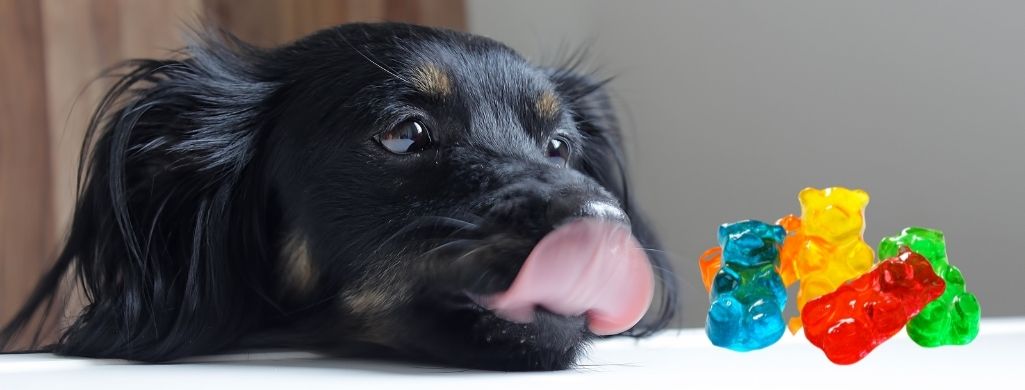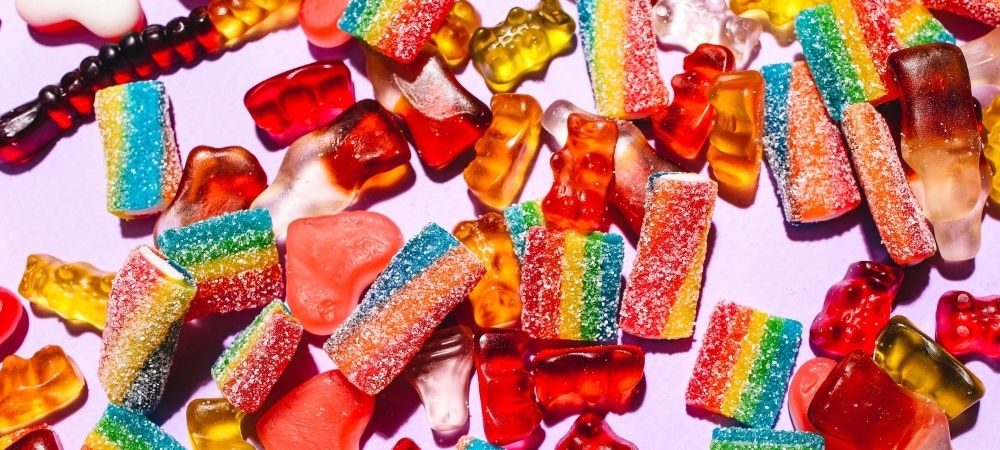
You probably enjoy gummy bears — all the shapes and sizes. We usually have one favorite, though. And it feels unfair not to give a little of that deliciousness to our furry friends.
But are gummy bears safe for dogs? Just one gummy bear can’t hurt them. Right?
Tread carefully. Let’s learn whether gummy bears belong to a dog’s diet at all.
Can Dogs Eat Gummy Bears?
In short — no, dogs should not eat gummy bears. There are too many risks regarding your pet’s health.
Gummy bears are very high in sugar, whether it comes from corn syrup or fruit juice. The only thing worse are sugar-free gummy bears. These contain xylitol, which is an artificial sweetener and extremely toxic to dogs.
Furthermore, gummy bears and the packaging are a choking hazard and could cause intestinal blockages in your dog.
None of these are fun or safe for dogs who happen to eat gummy bears.
Are Gummy Bears Bad for Dogs?
Yes, gummy bears can be pretty bad for dogs. Eating gummy bears can impact your dog’s health in more ways than one. Here are some of the symptoms they might experience:
Gastrointestinal Problems
Because of high sugar, gummy bears can cause an upset stomach and digestive problems in dogs. Symptoms include vomiting, diarrhea, nausea, problems with the stool, lack of appetite.
Sugar-free gummies usually contain artificial sweeteners like maltitol, sorbitol, and stevia, or citric acid. None of these are necessarily toxic to dogs, but they will cause gastrointestinal upset and diarrhea.
If a dog eats gummy bears, check the ingredients and watch your dog closely for the above symptoms. The symptoms will usually run their course after some time.
Smaller dog breeds might experience dehydration and even hypoglycemia (low blood sugar).
Low Blood Sugar and Liver Damage
While sugar intake symptoms sound nasty, they are far from the worst ingredient in gummy bears.
They could contain xylitol, an artificial sweetener that is extremely toxic to dogs. Ingesting even small amounts of xylitol can lead to xylitol toxicity.
One of the main side effects of xylitol poisoning is severe hypoglycemia (low blood sugar). The first signs will show after 30 to 60 minutes of consuming xylitol and can last over 12 hours.
Symptoms include vomiting, weakness, wobbly posture. If not treated, they lead to seizures, coma, and even the death of the pet.
Additionally, xylitol could cause hepatic necrosis — severe liver damage. The liver is responsible for blood clotting, so hepatic necrosis could lead to internal bleeding. For dogs who develop hepatic necrosis, the prognosis is quite grim.
If your dog ate gummy bears with xylitol, don’t waste time! Immediately take them to a vet clinic and call the veterinarian on your way there.
THC Toxicity
Some gummy bears contain hemp or THC. These could lead to marijuana and THC toxicity in dogs. The symptoms may occur after 5 mins and up to after 12 hours. Usually, the dog will get calm and lethargic, with dilated pupils. They could also have a wobbly posture or vomit.
In severe cases, THC toxicity leads to tremors and seizures.
Eating sweets with THC or CBD, munching on the dog owner’s stash, or through second-hand smoke — these can all lead to marijuana toxicity. If you notice the symptoms, call the vet since the dog may need the treatment.
Intestinal Obstruction
There is also the risk of your dog eating the wrapping. Eating the packaging is a choking hazard and could even lead to intestinal blockages.
Symptoms of intestinal blockage include:
- Repetitive vomiting
- Diarrhea
- Hard time defecating
- Abdominal pain
- Loss of appetite
- Struggling to keep water down
If your dog ate wrapping, contact the veterinarian immediately and ask for instructions. In most cases, surgery is needed.

Can Dogs Eat Gummy Bears Without Xylitol?
Xylitol is by far the most toxic of all artificial sweeteners when it comes to dogs. Naturally, the question is: can dogs eat gummy bears that are xylitol-free?
These are indeed safer than the ones with xylitol, but they are still not recommended. Remember, they are human food — and the one with high sugar content and loads of processed ingredients.
At the very least, these will cause serious digestive issues if your dog ate them. Over time, they lead to a host of other problems, like weight gain, obesity, and related health issues.
Different Types of Gummy Bears
There are many types of gummy candies in the market. While all of them carry health risks, some are more dangerous than others. Let’s look at different brands and how much of a threat they pose to your pooch.
Can Dogs Eat Sour Gummy Bears?
Sour gummy bears have a low sugar content but a high amount of citric acid. While citric acid is not that harmful to your dog, it still can cause diarrhea and digestive issues.
As with most other types of candy, sour gummy bears have added artificial colorings. In general, these should be avoided since they might trigger allergies.
Some sour gummy bears are made with corn syrup and will be high in sugar.
All these ingredients lead to digestive issues, weight gain and obesity, diabetes, and a host of other related health problems.
Can Dogs Eat Albanese Gummy Bears?
Albanese gummy bears do not contain xylitol, but they do have a sugar substitute called maltitol syrup.
Maltitol syrup is not toxic to dogs, but that doesn’t mean these gummy bears are safe.
In addition to high sugar and potential gluten allergies, Albanese gummy bears can cause diarrhea and obesity. Dogs should stay away from these.
Can Dogs Eat Black Forest Gummy Bears?
Black forest gummy bears have corn syrup, sugar, citric acid, apple juice concentrate, and artificial flavors.
They are very high in sugar, which can lead to tooth decay, obesity, and diabetes. Citric acid can cause digestive issues in dogs.
Your dog should not eat them.
Can Dogs Eat Haribo Gummy Bears?
Luckily, Haribo gummy bears do not contain xylitol. But they do have a lot of other harmful ingredients.
Haribo gummy bears are very high in sugar and fats, which can lead to upset stomach, obesity, diabetes, and even pancreatitis in dogs.
These gummies also have traces of milk and wheat. If your dog is lactose-intolerant or has a gluten allergy (or both), they can be very harmful.
Furthermore, artificial colors in Haribo (Yellow 5, Red 40, Blue 1) are harmful to dogs and can cause allergies.
Sugar-free Haribo gummy bears contain a sugar alcohol maltitol, which leads to flatulence and diarrhea in dogs.
It’s best to keep these far away from your canine companion. If your dog eats Haribo gummies, it might be best to call a vet immediately.
Can Dogs Eat Gummy Lifesavers?
Gummy lifesavers might taste great, but dogs should not eat them.
The gummy lifesavers are very high in sugar. Sugary foods will lead to tooth decay, weight gain, obesity, and diabetes in dogs if fed regularly. At the very least, they will cause an upset stomach and possibly vomiting and diarrhea.
Can Dogs Eat CBD Gummy Bears?
Sugar in CBD gummy bears is also quite dangerous to dogs, in addition to the CBD itself.
The CBD component will typically make the dog dehydrated and thirsty. In extreme cases, it might lead to low blood pressure and require medical treatment.
Can Dogs Eat Hemp Gummies?
Eating gummy bears with hemp is not problematic because of the hemp, but sugar.
The high sugar content makes these sweets harmful to dogs. It can lead to many health issues, so dogs should not eat hemp gummies.
Some people believe that hemp alone carries many health benefits for dogs.
Can Dogs Eat THC Gummy Bears?
THC gummy bears are dangerous for dogs. It’s best to keep them out of the dog’s reach.
The high sugar content can lead to digestive problems, weight gain, obesity, and diabetes. The THC in them can even make dogs comatose due to the intake of too many THC gummy bears at once.
If your dog eats gummy bears with THC, call a vet immediately! Do not induce vomiting unless instructed.

Can Dogs Eat Gummy Candy?
Is gummy candy safe for dogs? In short, no, dogs should not eat them.
All the gummy candy is high in sugar and leads to digestive upset, obesity, diabetes, and related health issues.
Can Dogs Eat Gummy Snacks?
No, dogs should not eat gummy snacks.
Gummy snacks are also very high in sugar. Sugar is harmful to dogs and leads to digestive problems, weight problems, diabetes, and related health issues.
Can Dogs Eat Peach Gummy Rings?
Surprisingly (or not?), peach gummy rings don’t contain peaches.
They do have loads of sugar and artificial colors, so dogs should not eat them.
Can Dogs Eat Gummy Worms?
Gummy worms are just fun, right? Even the dogs seem to like their shape and chewing on them.
But the shape doesn’t change the ingredients. Gummy worms are still high in sugar.
If your dog ate gummy worms, they might show signs of an upset stomach, abdominal pain, vomiting, and diarrhea.
Can Dogs Eat Sour Gummy Worms?
No, dogs should not eat sour gummy worms.
They are typically high in sugar and processed ingredients. Furthermore, some of them might contain citric acid.
Citric acid is not toxic to dogs, but it can cause digestive problems. In large enough quantities of citric acid, some dogs experience irritation and even CNS depression.
Can Dogs Eat Trolli Gummy Worms?
Trolli gummy worms contain loads of sugar and corn starch. Dogs shouldn’t eat them.
These ingredients will lead to obesity and potentially even diabetes and heart disease.
Can Dogs Eat Gummy Fruit Snacks?
No, dogs should not eat these either.
Gummy fruit snacks contain fruit juice and not corn syrup. They might be slightly healthier, but they are still very high in sugar from the juice. Sugar can lead to a myriad of health issues in dogs, like weight gain, obesity, diabetes, and heart problems.
Can Dogs Eat Fish Oil Gummies?
Dogs shouldn’t eat fish oil gummies.
Fish oil gummies contain gelatin and are very high in sugar. Ingesting them could lead to abdominal pain, diarrhea, vomiting. Long-term consumption causes weight gain, obesity, and diabetes.
Can Dogs Eat Human Gummy Vitamins?
Dogs should never eat human gummy vitamins.
Human gummy vitamins usually contain xylitol. Xylitol is one of the most poisonous substances for dogs. Even small amounts can cause xylitol poisoning in medium-sized dogs.
Xylitol toxicity decreases blood sugar, causes liver and kidney failure, coma, and even death of the pet.
If your dog eats human gummy vitamins, call a pet poison helpline and immediately take them to a vet clinic.
My Dog Ate Gummy Bears – What Should I Do?
If your dog ate one gummy bear and the regular kind, they would probably experience some digestive issues. These should resolve with time.
However, if your pet eats sweets with xylitol, they might start showing symptoms of xylitol poisoning after 30 or 60 minutes. Symptoms include:
- Vomiting
- Diarrhea
- Wobbly posture
- Lethargy
- Tremors
- Seizures
- Coma
Should xylitol toxicity develop into hepatic necrosis, i.e. liver failure, the prognosis is grim. There is no known antidote for xylitol poisoning. Time is of the essence in this case — so take your dog to a vet clinic immediately. Even with intensive care, the result can be fatal.
In case of THC poisoning, you should also take your dog to a vet clinic. They might keep them there and put them on IV fluids. Sometimes, the vet will induce vomiting and use activated charcoal to flush out the toxins.
Gummy Bear, Yummy Bear
One gummy bear, provided it contains no xylitol, is unlikely to harm your dog. However, if your pooch ate candies with xylitol, it’s best to take them to a vet clinic immediately. Xylitol is extremely dangerous to dogs and could result in the death of your pet.
While these sweet treats seem fun, and we would like to share them with our furry friends, we really should not. Even without xylitol, they are high in sugars, fat, and other harmful ingredients.
As far as dogs are concerned, life is much sweeter without them.

